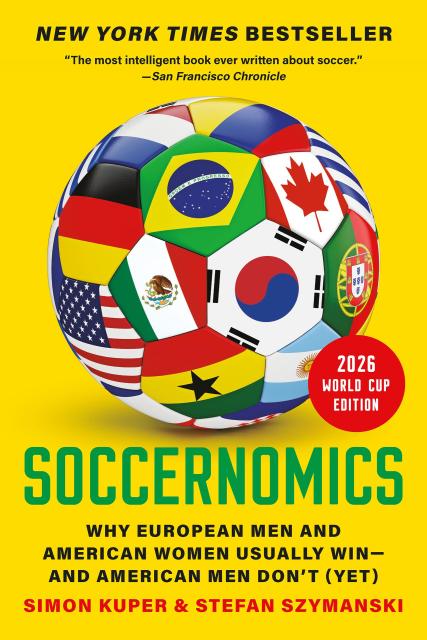By clicking “Accept,” you agree to the use of cookies and similar technologies on your device as set forth in our Cookie Policy and our Privacy Policy. Please note that certain cookies are essential for this website to function properly and do not require user consent to be deployed.
Soccernomics (2026 World Cup Edition)
Why European Men and American Women Usually Win—and American Men Don’t (Yet)
Contributors
By Simon Kuper
Formats and Prices
- On Sale
- May 5, 2026
- Page Count
- 496 pages
- Publisher
- Bold Type Books
- ISBN-13
- 9781645030775
Price
$21.99Price
$28.99 CADFormat
Format:
- Trade Paperback $21.99 $28.99 CAD
- ebook $15.99 $20.99 CAD
- Audiobook Download (Unabridged) $31.99
Buy from Other Retailers:
In this modern classic, a leading sportswriter and an acclaimed sports economist apply high-powered analytical tools to everyday soccer topics
“Soccernomics is the most intelligent book ever written about soccer.” ―San Francisco Chronicle
Why do clubs almost always lose money—and does it mean some will disappear? Why doesn’t America dominate the sport internationally? Do coaches actually even matter? These are the questions that most consume soccer fans—and Soccernomics holds the answers.
Soccernomics is a revolutionary way of looking at soccer that has helped to change how some of the world’s biggest clubs are run. Using insights and analogies from economics, statistics, psychology, and business to cast a new and entertaining light on how the game works, experts Simon Kuper and Stefan Szymanski reveal the often surprisingly counterintuitive truths about soccer.
This 2026 World Cup edition is updated throughout, including a brand-new chapter discussing MLS, Messi joining Inter Miami, and the rise of soccer in the United States. Soccernomics remains essential reading for anyone in search of a strategic, systematic perspective on the game.
Genre:
-
“[Kuper and Szymanski] do for soccer what Moneyball did for baseball—put the game under an analytical microscope using statistics, economics, psychology, and intuition to try to transform a dogmatic sport.”New York Times
-
“Since the publication of the first edition of Soccernomics there have been several attempts to copy its content. Yet few authors in the world of soccer writing can tell a human story like Simon Kuper, and even fewer academics can write an understandable narrative with numbers like Stefan Szymanski. Together the two men raise the bar again, bringing new insights to an already great body of work that is accessible and interesting to the quant and casual reader alike. . . . I highly recommend you pick it up for yourself, even if you have already read the first edition. You will not be disappointed.”Forbes
-
“Fascinating.”Vanity Fair
-
“With Soccernomics, the FT’s indispensable Simon Kuper and top‑flight sports economist Stefan Szymanski bring scrupulous economic analysis and statistical rigor to a sport long dependent on hoary—and, it seems, unfounded—assumptions. . . . Gripping and essential.”Slate, Best Books of the Year
-
“[Szymanski and Kuper] entertainingly demolish soccer shibboleths. . . . Well argued and clear‑headed.”Financial Times, Best Books of the Year
-
“Entertaining.”Economist
-
“Soccernomics is the most intelligent book ever written about soccer.”San Francisco Chronicle
-
“It's quite a book....Soccernomics explains how the lessons of Moneyball (sports teams are not completely rational) apply to the world's favorite sport.”Huffington Post
-
“Using data analysis, history and psychology, [Soccernomics] punctures dozens of clichés about what it takes to win, and who makes money in soccer—and in sports in general.”Associated Press
-
“[Kuper and Szymanski] have created a blend of Freakonomics and Fever Pitch, bringing surprising economic analysis to bear on the world's most popular sport...This mix of economic analysis and anecdote makes for a thought-provoking, often amusing read. Here, at last, is a British answer to Michael Lewis's baseball-meets-cash bestseller Moneyball.”Bloomberg News
-
“[Soccernomics] is a sporting tale in the Freakonomics mode of inquiry, using statistics to come up with fascinating conclusions.”Independent (UK), Best Books of the Year
-
“More thoughtful than most of its rivals and, by football standards, positively intellectual....Kuper, a brilliantly contrary columnist, and Szymanski, an economics professor...find plenty of fertile territory in their commendable determination to overturn the lazy preconceptions rife in football.”Times (UK)
-
“Kuper and Szymanski are...a highly effective and scrupulously rational team, combining the former's detailed and nuanced understanding of European football with the latter's sophisticated econometric analysis. With a remarkable lightness of touch, they demonstrate the limits of conventional thinking in football, as well as the real patterns of behaviour that shape sporting outcomes.”Prospect (UK)
-
“If you're a football fan, I'll save you some time: read this book ... compulsive reading ... thoroughly convincing.”Daily Telegraph (UK)
-
“Szymanksi has recently published the best introduction to sports economics... while Kuper is probably the smartest of the new generation of super‑smart sportswriters... fascinating stories.”Observer (UK)
-
“[Kuper and Szymanski] basically trash every cliché about football you ever held to be true. It's bravura stuff… the study of managers buying players and building a club is one you’ll feel like photocopying and sending to your team's chairman.”Metro (UK)
-
“It's a fascinating book with the potential to effect genuine change in the sport.”Booklist (starred)
-
“Small book, big wallop!....Entusiastically recommended to all soccer fans, general and specialized, as well as those thinking of becoming one,”Library Journal
-
“Soccernomics [is] a sharply written and provocative examination of the world’s game seen through the prism of economics and statistical data. It demolishes almost everything that most soccer fans believe about the game and how professional soccer teams should operate.”Globe and Mail (Canada)
-
“Quite an entertaining read.”Simply Futbol
-
“Wonderful book.”Pro Soccer Talk (NBC Sports blog)
-
“Soccernomics . . . remains essential reading for anyone seeking an analytical take on the game.”Keeping Score (TIME soccer blog)
-
“The authors take what ‘everybody’ knows about success and failure in soccer and subject it to rigorous empirical analysis embedded in good stories that carry the narrative along. . . . Highly recommended.”Choice
-
“There just aren't that many interesting, intelligent, analytical books about the world's most popular game, but this is one.”Blogcritics Magazine
-
“Any sports fan ready to take on board new ways of thinking might, like me, never look at a penalty kick or a league table and certainly not follow a major international tournament wuite the same way again.”ABC News (Australia)
-
“Many explanations [of England’s poor form] can be found in the book Soccernomics in a segment entitled ‘Why England Loses.’ (This is well worth a read for any English football fan; essentially, you overvalue your football heritage and undervalue the benefits of innovation.)”Stephen J. Dubner, coauthor of Freakonomics
-
“Oh, Rooney’s the best. [My son] Ben thinks that England might be in the top four, but that’s it. He knows the starting line up of every European team. We’re reading this very interesting book about football together, you know Soccernomics.”Lorrie Moore, author of A Gate at the Stairs
-
“Quite magnificent—a sort of Freakanomics of soccer.”Jonathan Wilson, The Guardian
-
“It's a really good book. If more people read it, they'd understand some of the reasons why England doesn't win. Everyone can have an opinion, but they back it up with stats.”Jamie Carragher, Liverpool F.C.
-
“Should still be compulsory reading for all poor suffering England fans.”Jim O'Neill, former chairperson of Goldman Sachs Asset Management
Newsletter Signup
By clicking ‘Sign Up,’ I acknowledge that I have read and agree to Hachette Book Group’s Privacy Policy and Terms of Use








